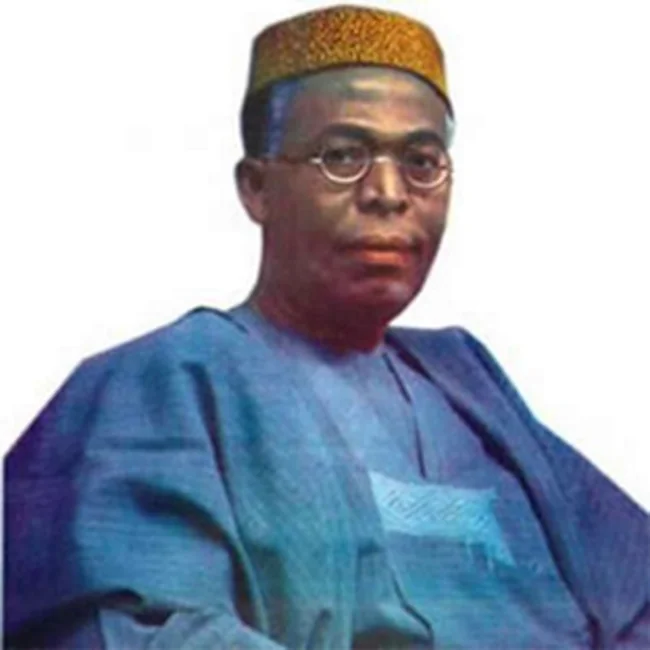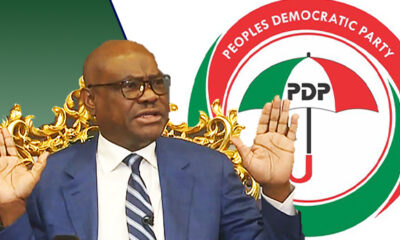Growing up, Obafemi Awolowo was everything you could think of. From a journalist, teacher, clerk, money lender to a taxi driver, Obafemi rose to become a lawyer, publisher and a political leader. Through this, he would become a principal participant in the struggle for Nigerian independence.
He played a major role in the constitutional conferences in London and Lagos that paved the way for independence, having served as Premier of the self-governing Western region from 1954 until Nigeria achieved full independence from Britain in 1960.
Awolowo shot to fame in politics in the 1940s after leading a mass protest against the ban on exporting of palm kernel. He soon got attracted to scores of Nigerians, who believed he could help them triumph over the British.
Jeremiah Oyeniyi Obafemi Awolowo (full name) was born on March 6, 1909, to Chief David Sopolu Awolowo and his wife Mary Efunyela Awolowo in Ikenne, Remo, in what is now the Ogun State of Nigeria.
He received his early education at various schools in Ogun State. By age 11, he had to hold on with his studies following the death of his father that strained the family financially.
Awolowo had to do menial jobs such as fetching firewood in order to support his education. Despite the challenges, he headed to Wesley College, Ibadan (a teachers’ college) in 1927 before beginning work as a correspondent for the Nigerian Times.
While working as a journalist in the 1930s, accounts stated that he founded many political and economic organisations such as the Trade Unions Congress of Nigeria, The Nigerian Produce Traders Association, The Nigerian Motor Transport Union, and Egbe Omo Oduduwa, a Yoruba political and cultural organization that aimed at uniting the Yoruba tribe of Nigeria.
In the midst of these ventures, Awolowo still wanted to pursue his formal education. He went to London in 1944 to study law, and that was where he founded the Egbe Omo Oduduwa.
Awolowo, during this period, also wrote the influential Path to Nigerian Freedom (1947), in which he highlighted the needed for an independent Nigeria and a federal form of government.
In 1947 Awolowo returned to Ibadan, Nigeria to practice law, and the following year he established the Egbe Omo Oduduwa in Nigeria. In 1951 he founded a political party, the Action Group, also known as Egbe Afenifere in Western part of Nigeria as part of the Social Programme for the emancipation of Yoruba race.
The party demanded an immediate end to British rule and for the development of several social welfare programs. Awolowo’s party won the first elections ever conducted in Western Nigeria, one of the colony’s three administrative divisions.
Following this, his party formed the first elected government in the Western Region and Awolowo, now a chief, became the Leader of Government Business and Minister for Local Government in 1952.
In 1954, the politician became the first Premier of the Western Region. His party won the elections again in May 1956 and the Nigerian statesman retained his position as Premier. From 1954 to 1959, as premier of the Western Region, Awolowo improved education, agricultural practices, and social services.
Specifically, his administration, according to the late statesman’s foundation:
evolved, and was served by, the most efficient Civil Service in Black Africa;
introduced and successfully implemented the first Free Primary Education programme in Africa;
introduced and successfully managed the first Free Medical Service programme in Nigeria – for children up to the age of 18;
established the first Television Station in Africa;
built the Liberty Stadium, the first such modem sports facility in Nigeria;
introduced and successfully implemented the first minimum wage policy in Nigeria and actually paid to Western Nigerians from October 1954 a minimum wage that was double the amount paid to workers of the same level in some other parts of Nigeria;
set up Nigeria’s first industrial complex at Ikeja;
set up Nigeria’s first commercial Housing Estates at Ikeja and Bodija, Ibadan.
On December 12, 1959, Awolowo voluntarily gave up his position when he was elected into the House of Representatives and he became the Leader of Opposition in Nigeria’s central legislature.
He began to question the way incumbent leaders governed the nation and sought other alternatives along which the Nigerian government should handle affairs.
Soon, his views attracted many political opponents, who saw him as a major threat. Following a trial for treasonable felony, Awolowo was jailed for 10 years in September 1963, but he was released in July 1966 after a new federal military government took over affairs of the country.
Out of prison, Awolowo was made the Minister in charge of Treasury and was to provide political support as Vice Chairman in the Federal administration.
After being instrumental in giving Nigeria a National Development plan, Awolowo resigned from the government. In the mid-1970s he was chancellor of the University of Ife (now Obafemi Awolowo University) and Ahmadu Bello University.
The Obafemi Awolowo Foundation documents that while in the Federal government, Awolowo managed the finances of Nigeria so “competently that the Federal Government successfully waged an expensive 30-month war against secession without resorting to foreign loans and without compromising its sovereignty.”
When the 12-year ban on political activity was lifted in 1978 by Nigeria’s Armed Forces in preparation for a return to civilian rule, Awolowo became the leader of the Unity Party of Nigeria, a party he formed.
He ran for president in the elections of 1979 and 1983 but was defeated both times by Shehu Shagari. Awolowo would continue to lead the Unity Party until it was banned with several other political parties during a military coup at the end of 1983. Awolowo then retired from politics.
Being a political thinker who also loved to put his thoughts on paper, Awolowo wrote several books including Path to Nigerian Freedom (1947), Awo – an autobiography (1960), Thoughts on the Nigerian Constitution (1966), The People’s Republic (1968), The Strategy and Tactics of the People’s Republic (1970), The Problems of Africa: The need for ideological reappraisal (1977), and Adventures in PowerBook 1: My March Through Prison (1985).
In recognition of his invaluable service to Nigeria, he was given the highest honour in the land – the Grand Commander of the Order of the Federal Republic (GCFR)in 1982. He was also awarded the Grand Band of the Order of the Star of Africa by the Republic of Liberia in 1968 and made Grand-Officer de l’Ordre National du Lion, Republique du Senegal, in 1972.
Further, for his contribution to Nigerian statehood and development, the Nigerian government renamed the University of Ife, The Obafemi Awolowo University on May 12, 1987.
On October 1, 2010, while celebrating the nation’s golden jubilee in Abuja, the Nigerian government honoured Awolowo posthumously for his contribution to the Nigerian independence movement.
Awolowo died in Ikenne, Ogun State, Nigeria at the age of 78 on May 9, 1987. He did not leave behind only a wife, children and many grand-children, but scores of Nigerian supporters who still cherish him.
Source: Mildred Europa Taylor
FOLLOW US ON:
FACEBOOK
TWITTER
PINTEREST
TIKTOK
YOUTUBE
LINKEDIN
TUMBLR
INSTAGRAM






























